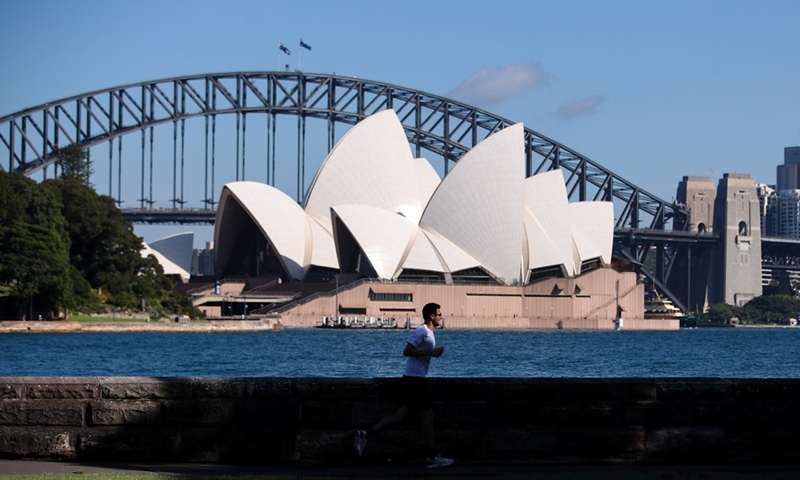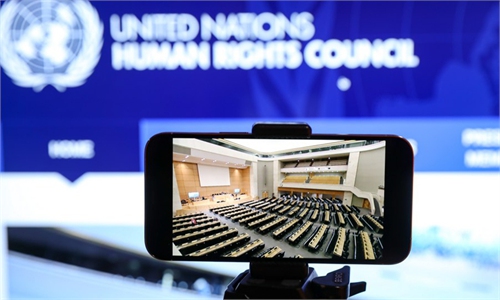
A man runs in a park opposite the Sydney Opera House in Sydney, Australia, on Feb. 26, 2021.(Photo: Xinhua)
Human Rights Watch, which has increasingly degenerated to a Western political tool, accused Beijing supporters and the Chinese government of harassing, intimating and surveilling Chinese "pro-democracy" students in Australia in a report released on Wednesday. The 102-page report, "'They Don't Understand the Fear We Have': How China's Long Reach of Repression Undermines Academic Freedom at Australia's Universities," described how "pro-democracy" students and academics teaching China courses on Australian campuses feel pressured and feared to self-censor to avoid threats and harassments from pro-Beijing classmates and being "reported on" to authorities back home.Human Rights Watch is notorious for fabricating hackneyed rumors and lies, especially issues related to Hong Kong and Xinjiang, to discredit China. It is no exception this time.
Its latest report drew the conclusion that Chinese "pro-democracy" students in Australia experience harassment and fear punishment if they speak out on sensitive issues based on interviews with 24 students and 22 academics who teach mainland or Hong Kong students or their key area of expertise is China. There are about 160,000 Chinese students enrolled in Australian universities. If it were a reliable and scientific survey, the Human Rights Watch wouldn't only have resorted to such a miniscule proportion, all of which are under pseudonyms.
The report didn't provide solid evidence. Its accusations are created out of thin air. For instance, it quoted an interviewee under a pseudonym "J" who supported the 2014 Hong Kong protests as saying that she was concerned for family in the Chinese mainland because she has "heard from Hong Kong students about the doxing, threatening families." Let's be clear: J's family hasn't received any threats. Human Rights Watch simply made an issue of J's claim which is based on a hearsay and used it as evidence to throw mud at China. Report based on such absurd claim cannot hold water at all.
"I am afraid the real situation on Australian campuses is the opposite of what Human Rights Watch's report portrayed," Chen Hong, a professor and director of the Australian Studies Center, East China Normal University, told the Global Times. Chen said that as anti-China hysteria has hit fever pitch in Australia in recent years, a "McCarthy scare" not only prevails in Australian politics, but also in universities. Many mainland students dare not publicly express their support for the Chinese system or China's policies on Hong Kong and Xinjiang.
On March 18, an anonymous article calling on the University of Melbourne to stop accepting Chinese students due to the Chinese government's alleged atrocities against Uygur Muslims was published on the unofficial student newspaper of the Melbourne Law School, sparking anxiety that anti-Chinese and anti-Asian racism will be further inflamed. Under such an intensifying anti-China and discriminatory atmosphere against Chinese students, many students from the mainland have to keep silent on sensitive issues on Xinjiang or Hong Kong. Those students account for the majority of the Chinese student community in Australia. They were born and grew up in China. They know the truth about China and support China's system and policies, but have to become the "silent majority." Why doesn't Human Rights Watch pay any attention to their undermined freedom of speech and the discrimination they are experiencing in Australia?
The truth is: This human rights group doesn't care about Australia's freedom of speech and academic freedom at all. It has played dirty tricks of fabricating lies to portray a slim number of supporters of Hong Kong secessionists as victims. Its real aim is to turn Australian universities into a haven for "Hong Kong secession" advocates.
In recent years, Australia, under the incitement of some foreign anti-China forces, has foolishly jumped to the anti-China forefront, which has worsened Chinese public's views on Australia and Australian universities. Human Rights Watch, with its twisted and misinformed report, is attempting to fan the misconception about China and further stir up anti-China waves on Australian campuses. If Australia indulges such a trick, allowing the organization to further brew anti-China sentiment in its universities, for Chinese students, they may just have one fewer option for overseas studies, but for Australia, where Chinese students account for about 40 percent of all international student in the country, it will have to bear the bitter consequences.



